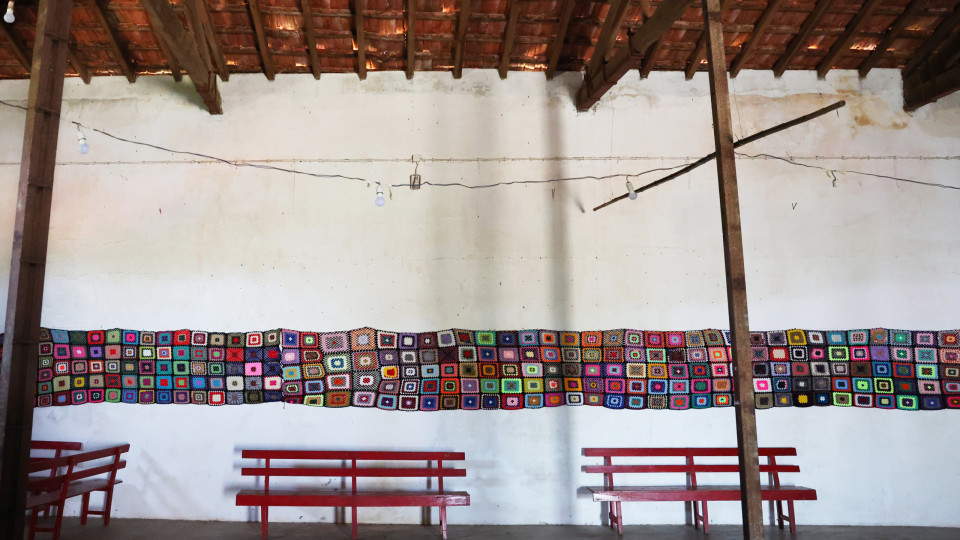Dream of Agrarian Reform in Alentejo village resisted until 2023
The "coming and going" of the past, with tractors loaded with oats for the barn, now contrasts with the "stagnation" in the old facilities of one of the last Collective Production Units (UCP) to close its doors in Alentejo.

© Lusa

País 25 de Abril
"The tractors would bring the oats in the trailer, I remember there being a lot of oats, they would come in, because the gate is big, and, with an auger, they would unload them inside", recalls to the Lusa news agency Augusta Ferreira, former manager of UCP Boa Esperança.
The oats "were arranged and stayed there, in bulk, in piles" in the barn and, then, "they were sold, throughout the year, and, during the sowing season, people would buy them to sow again", she continues.
At the end of 1975, in the middle of the Agrarian Reform period and in the "aftermath" of the 25th of April revolution, UCP Boa Esperança was born after the occupation of several estates in the area of the village of Lavre, in the municipality of Montemor-o-Novo, district of Évora.
Augusta Ferreira was a child and does not remember the period when the occupations took place, but she still remembers when she joined UCP, on a day in November 1976, then aged 14, to work in the fields.
"I worked in the fields for eight years and, then, I came to the office, in 1984", she reports, recalling that she was chosen, in a workers' plenary, to fill a vacant position in UCP's accounting department.
And there she stayed, first, as an employee and a cooperative member and, later, as chairwoman of the assembly board, for a total of 47 years, until November 2023, when the liquidation process was completed.
"Lately, it was the cattle, the sheep, and some pasture was sown for them. Crops were no longer grown, because we no longer had land to grow those crops", says Augusta Ferreira.
The liquidation lasted about seven years, from 2016 to November 2023, during which time the remaining properties, the headquarters, agricultural machinery and a herd of 700 sheep were sold.
But it was not always like this. At its peak, in the late 1970s, as Paulo Alves, also a former cooperative member and employee, attests to Lusa, Boa Esperança had "300 and some" workers and between five thousand and six thousand hectares of land.
"There was a lot of work and a lot of production", namely all kinds of cereals, such as oats or wheat, but also beans, rice, tomatoes, tobacco and pastures, in addition to the livestock, with pigs, cows and sheep, he recalls.
During that period, Augusta replies, UCP even had a butcher's shop in its facilities, in Lavre.
Noting that, like Augusta, he also joined at the age of 14, but later, in 1984, Paulo Alves says that, at that time, "the cooperative was no longer at its peak", after the departure of many workers and the return of some land to the owners.
"The whole idea of agrarian reform was being lost a bit, because the revolution era starting to pass", and the return of most of the land and the end of the leases that had been made precipitated the end of UCP, Augusta justifies.
The office in the former facilities seems to have stopped in time, with desks full of paperwork and shelves with files containing personnel charts or balance sheets. On a cork board, the notice for a 2012 general assembly is still posted.
These documents and other heritage should be transferred to the Montemor-o-Novo Municipal Archive, which includes the Agrarian Reform Documentation and Archive Centre, to be organised and made available to the public.
It is with some nostalgia that Augusta and Paulo talk about the labour advances that UCP promoted, giving as examples the granting of holidays and Social Security discounts or the simple issuance of a pay slip.
In addition, "UCP was always open to members and non-members", stresses Paulo, to which Augusta adds that, if someone needed a tractor or a chainsaw or even for parties, "the cooperative always helped".
The facilities of UCP Boa Esperança, located in a central street of Lavre, were acquired by the Montemor-o-Novo City Council, which intends to install a cultural forum there with the name of the writer José Saramago.
"It is the ideal space to perpetuate the memory of the relationship between the people of Lavre and the writer", highlights the deputy mayor of the municipality, Henrique Lopes, recalling that it was there that José Saramago lived for a period and was inspired for the work "Levantado do Chão".
Still in a very embryonic phase, the project foresees the requalification of the property to create a multipurpose auditorium, an exhibition space and a library, with books donated by José Saramago himself, among other features.
Read Also: Agrarian Reform was born in Santa Vitória, where the struggle is not forgotten (Portuguese version)

Descarregue a nossa App gratuita.
Oitavo ano consecutivo Escolha do Consumidor para Imprensa Online e eleito o produto do ano 2024.
* Estudo da e Netsonda, nov. e dez. 2023 produtodoano- pt.com






